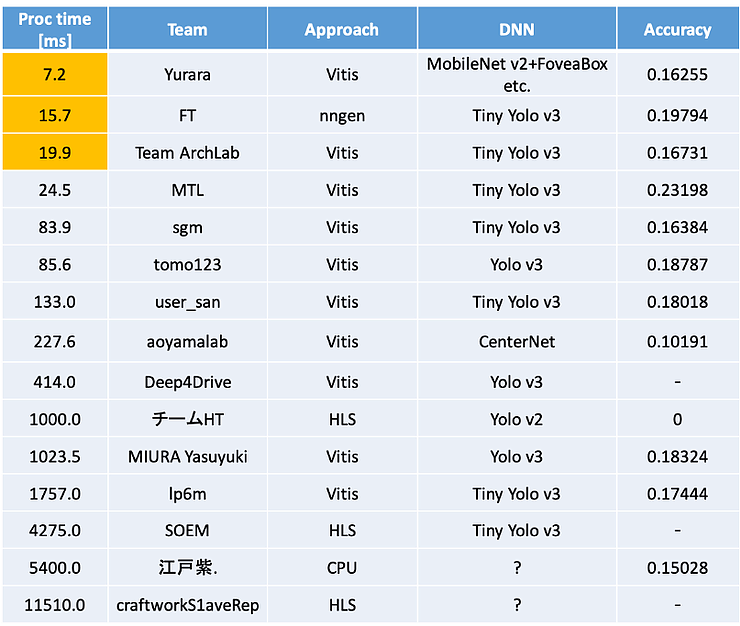2019年11月から2020年3月末にかけて実施していた、経済産業省、NEDO主催の第2回AIエッジコンテストは4月一杯で審査が完了し、最終結果が確定しました。当社は、このコンテストの企画、運営、審査に関わってきましたが、今回はコンテストの応募状況や結果について、簡単なサマリーを紹介したいと思います。
本コンテストは、
(アルゴリズム開発) 車両前方カメラ画像から物体を含む矩形領域を検出するアルゴリズムを作成
(アルゴリズム実装) ハードウェアアクセラレータなどの設計を行い、ターゲットのFPGAボードへのアルゴリズム実装を行う
の課題からなり、画像認識アルゴリズム開発からハードウェア実装まで行い、最終成果物としてFPGAボード上で動作するSDカードイメージを提出する、というかなり難易度が高い内容でした。
当初、ソフトウェア実装だけでなく、FPGAハードウェア実装も含めた課題のため、最終成果物の応募者数があまり伸びないのではないかと懸念しましたが、最終的には15件の提出があり、かつ、ほとんどの応募がしっかり動作する設計データとしてリリースされるなど、非常にレベルの高い戦いとなりました。
最終性能結果

今回Ultra96ボードというFPGAとしては安価な環境にもかかわらず、1秒間に60枚を超える性能(16ms以下の処理時間)を達成したチームも複数あり、上位の実装については、産業界から見ても競争力があるものが見受けられました。
新型コロナウイルス感染症流行の影響で、一部審査会をオンラインで行うなどしましたが、結果として、上位3チームとアイデア部門3チームの受賞者が決定しました。
今後の実装コンテストやハードウェアアクセラレータを用いたエッジAIの普及の一助になるよう、入賞者の成果について、実装に関わるレポート作成やオープンソース化を予定しており、これらの情報もコンテストサイトに掲載していく予定です。
この第2回コンテストに続き、第3回AIエッジコンテスト(アルゴリズムコンテスト 2 : 車両前方カメラ画像を活用した物体追跡課題)も募集を開始しています。我こそはという方は、是非応募してみてください!
The 2nd AI Edge Contest led by the Ministry of Economy, Trade and Industry and NEDO, and held from November 2019 to the end of March 2020, ended a screening process in April, and its results were confirmed. DMP had been involved in the planning, management, and screening of this contest, and would like to introduce a summary of the contest application status and results.
This contest consists of:
[Algorithm development]
Creating an algorithm to detect a rectangular area containing an object from dashboard camera images
[Algorithm implementation]
Designing a hardware accelerator and implementing the algorithm on a target FPGA board
It was a very difficult task from image recognition algorithm development to hardware implementation and to submit SD card images as the final product that operates on the FPGA board.
Initially, there was a concern that the number of applicants of the final deliverable would not increase because the task includes not only software implementation but also FPGA hardware implementation. However, it turned out to be a very high-level competition with 15 applications, most of which were released as design data that works very well.
The final performance results are summarized as the above table.
There are several teams that achieved competitive performance of more than 60 frames per second (processing time of 16 ms/frame or less) despite the environment of inexpensive Ultra96 FPGA board. The top-ranked implementations were found to be competitive even from the viewpoint of the industrial world.
Due to the influence of the new coronavirus infections, some screening meetings were held online, but as a result, the top 3 teams and 3 teams with good ideas were decided.
In order to contribute to the future implementation contests and the spread of edge AI using hardware accelerators, creating a report and open source related to the achievements of the prizewinners are scheduled, which are going to be posted on the contest site.
Following the 2nd Contest, applications for the 3rd AI Edge Contest (algorithm contest 2: task of tracking objects utilizing dashboard camera images) are being accepted now. Your applications are more than welcome!



